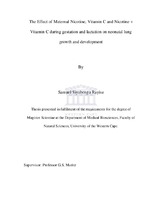| dc.description.abstract | Maternal smoking is known to cause serious health risks to the unborn child. Recent
studies implicate nicotine as the causative factor. Maternal nicotine exposure during
pregnancy and lactation interferes with foetal and neonatal lung growth and development,rendering the lung more susceptible to damage and diseases. Therefore, the aim of this study was to investigate: 1) the effect of maternal exposure to nicotine (1mg/kg BW/day) during all phases of lung development: 2) and vitamin C supplementation (0.5mg/kg BW/day) to prevent the adverse effects of maternal nicotine exposure on lung development in the offspring. This is based on studies in our laboratories which suggested that nicotine reduces the blood and tissue vitamin C content of the mother,thereby rendering the neonate more susceptible to oxidation damage. The chief motivation of this study was to establish whether an anti-oxidant, such as vitamin C, can be administered to smoking pregnant and lactating mothers in order to combat the deleterious effects of nicotine on the lung development of their offspring. It was found that although maternal nicotine exposure had no significant effect on the growth parameters of the offspring, it did have an effect on the development of the lung, compromising the ability of the lung to act as an organ of gaseous exchange. There was a
decrease in the surface area available for gas exchange. The change occurred after the lung reached maturation and resembled microscopic emphysema. Vitamin C supplementation was unable to fully protect the neonatal lung against the adverse effects of maternal nicotine exposure; it however partially protected the neonatal lung against structural deterioration. Supplementation with vitamin C definitely offers possibilities as a prophylactic to combat the detrimental influence of maternal nicotine-exposure on foetal and postnatal lung development. | en_US |

